人教版(2019)必修第三册:Unit2 Morals and Virtues同步讲义 学案(无答案)
文档属性
| 名称 | 人教版(2019)必修第三册:Unit2 Morals and Virtues同步讲义 学案(无答案) |
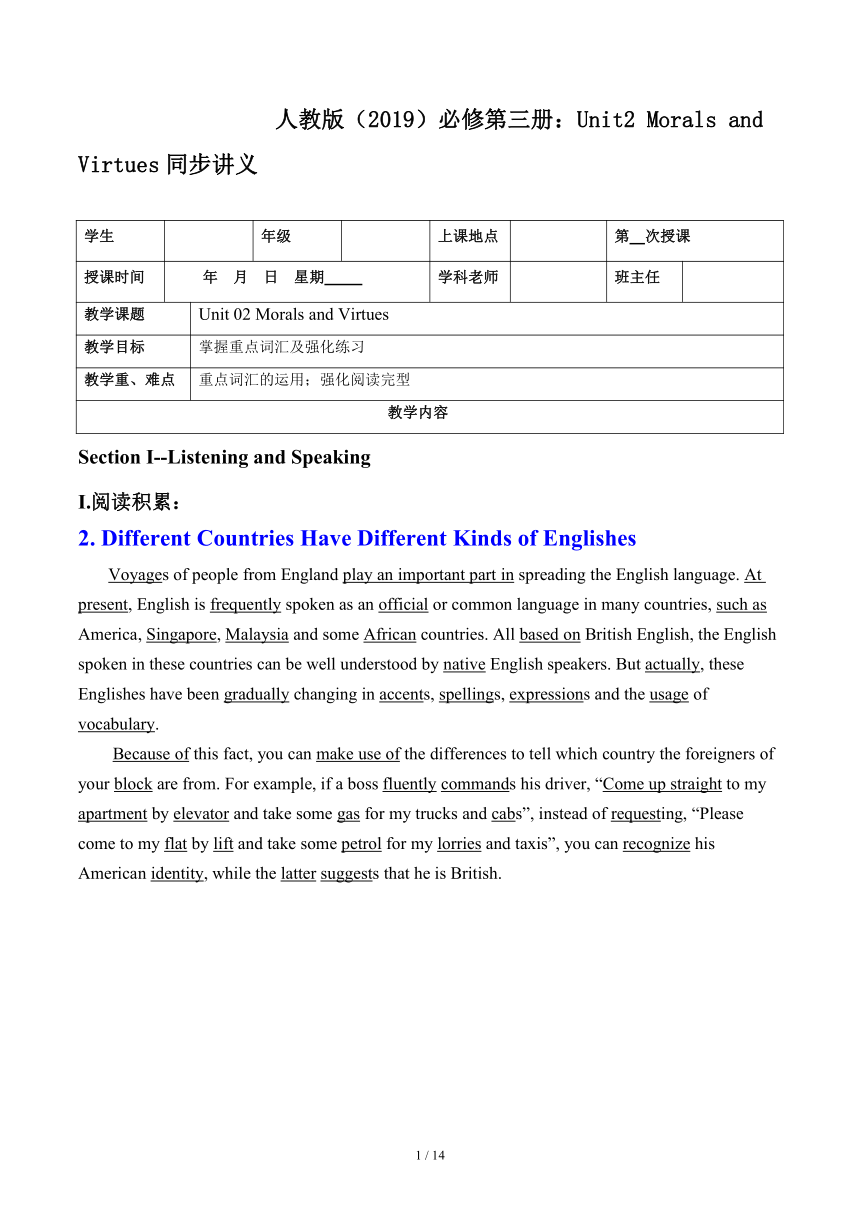
|
|
| 格式 | docx | ||
| 文件大小 | 42.1KB | ||
| 资源类型 | 教案 | ||
| 版本资源 | 人教版(2019) | ||
| 科目 | 英语 | ||
| 更新时间 | 2022-01-14 00:00:00 | ||
图片预览

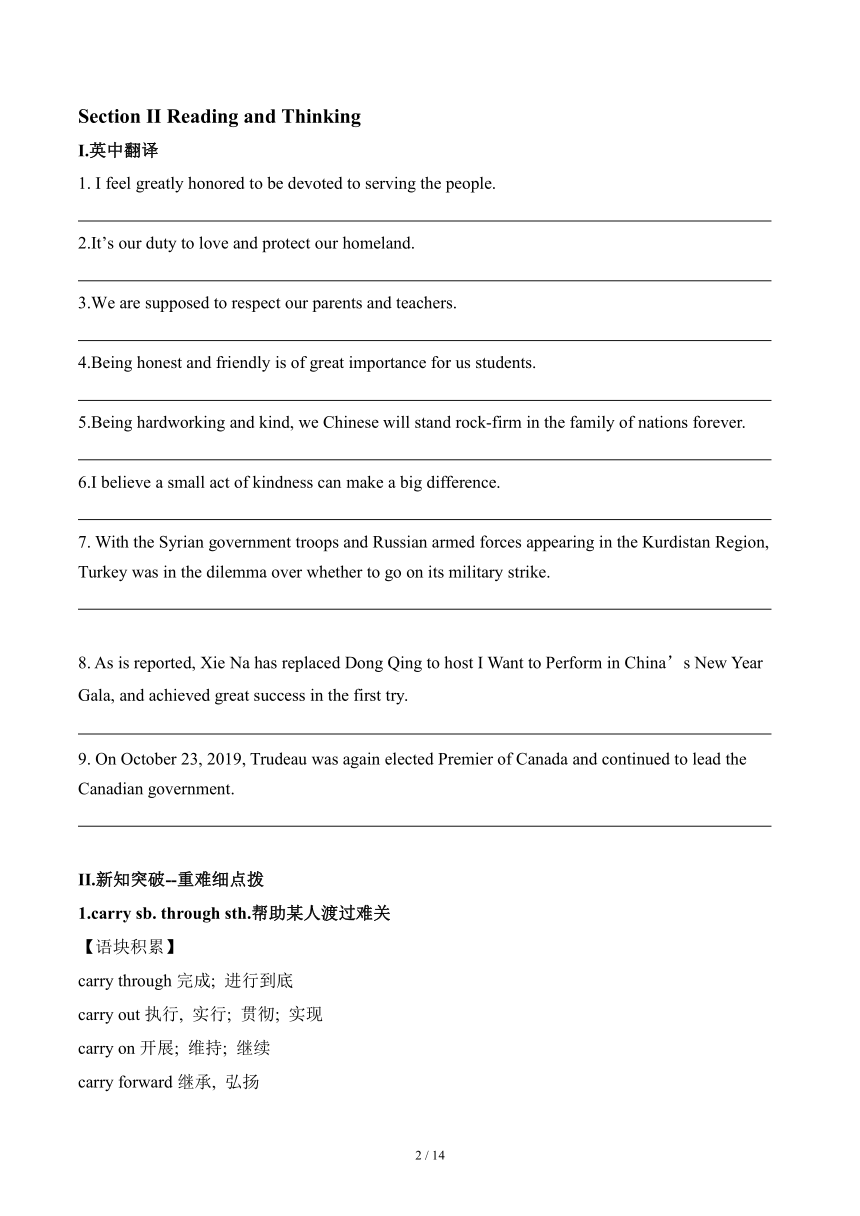
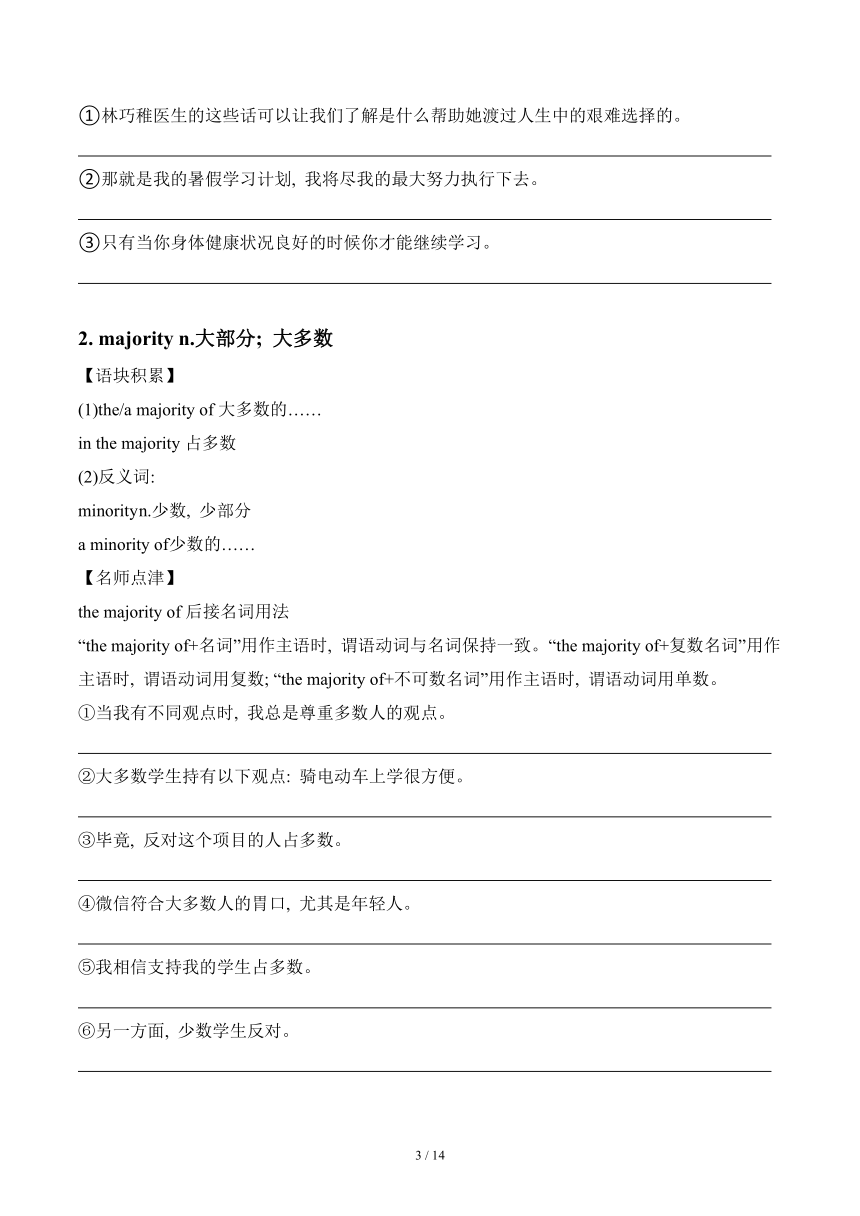
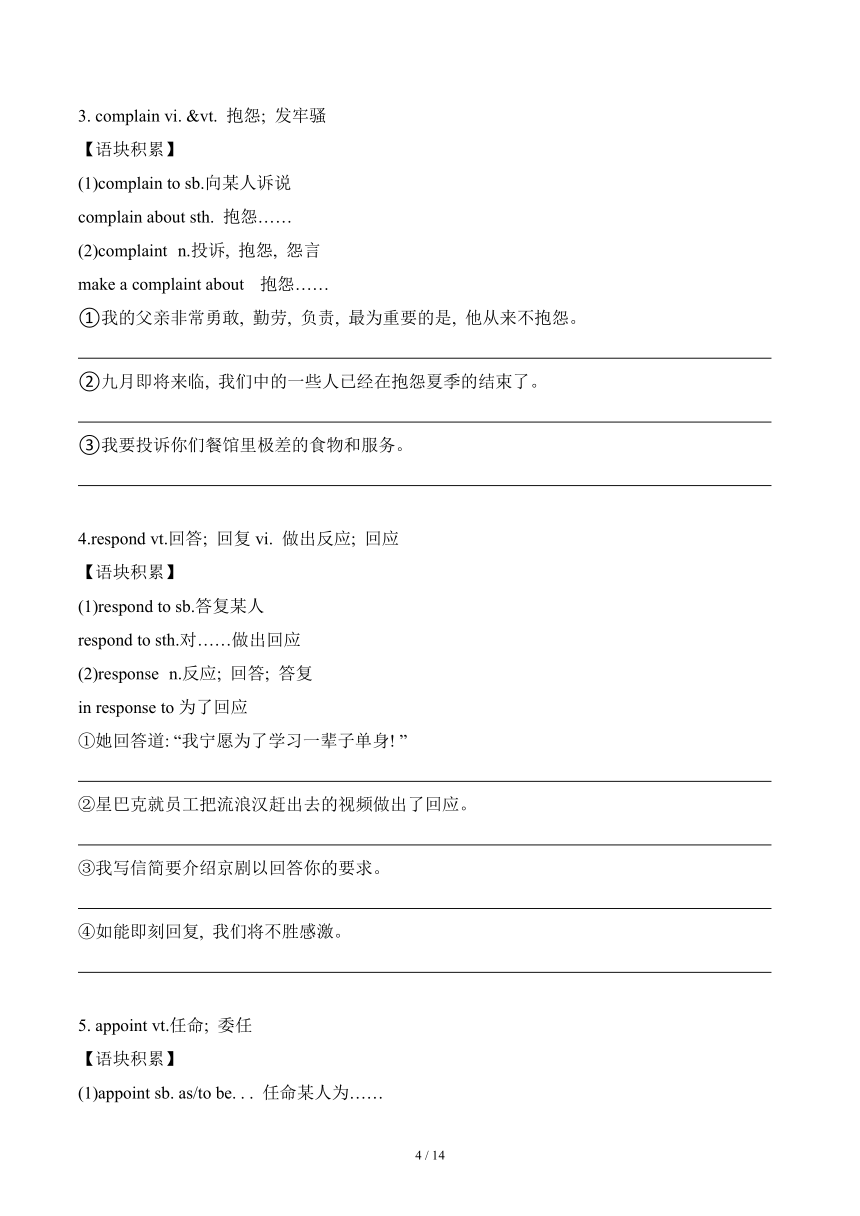
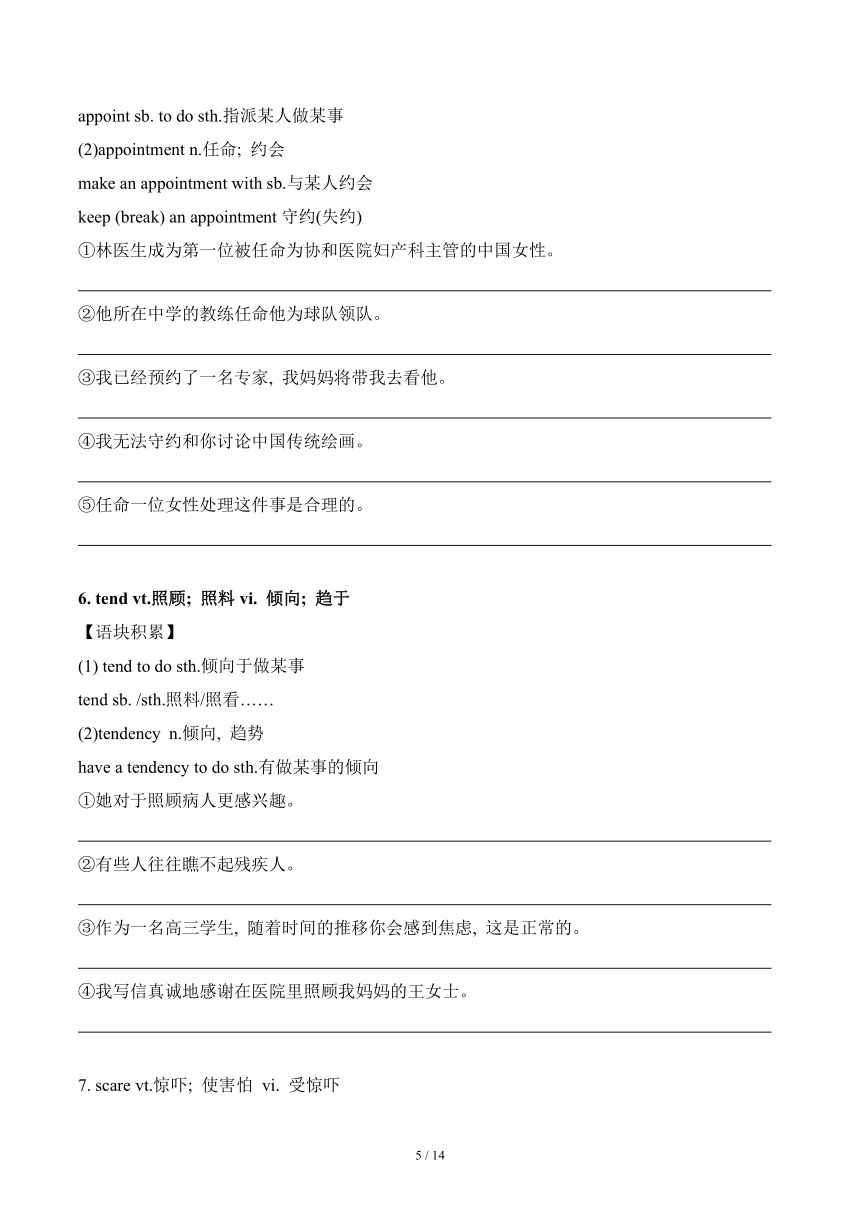
文档简介
人教版(2019)必修第三册:Unit2 Morals and Virtues同步讲义
学生 年级 上课地点 第 次授课
授课时间 年 月 日 星期 学科老师 班主任
教学课题 Unit 02 Morals and Virtues
教学目标 掌握重点词汇及强化练习
教学重、难点 重点词汇的运用;强化阅读完型
教学内容
Section Ⅰ--Listening and Speaking
I.阅读积累:
2. Different Countries Have Different Kinds of Englishes
Voyages of people from England play an important part in spreading the English language. At present, English is frequently spoken as an official or common language in many countries, such as America, Singapore, Malaysia and some African countries. All based on British English, the English spoken in these countries can be well understood by native English speakers. But actually, these Englishes have been gradually changing in accents, spellings, expressions and the usage of vocabulary.
Because of this fact, you can make use of the differences to tell which country the foreigners of your block are from. For example, if a boss fluently commands his driver, “Come up straight to my apartment by elevator and take some gas for my trucks and cabs”, instead of requesting, “Please come to my flat by lift and take some petrol for my lorries and taxis”, you can recognize his American identity, while the latter suggests that he is British.
Section Ⅱ Reading and Thinking
I.英中翻译
1. I feel greatly honored to be devoted to serving the people.
2.It’s our duty to love and protect our homeland.
3.We are supposed to respect our parents and teachers.
4.Being honest and friendly is of great importance for us students.
5.Being hardworking and kind, we Chinese will stand rock-firm in the family of nations forever.
6.I believe a small act of kindness can make a big difference.
7. With the Syrian government troops and Russian armed forces appearing in the Kurdistan Region, Turkey was in the dilemma over whether to go on its military strike.
8. As is reported, Xie Na has replaced Dong Qing to host I Want to Perform in China’s New Year Gala, and achieved great success in the first try.
9. On October 23, 2019, Trudeau was again elected Premier of Canada and continued to lead the Canadian government.
II.新知突破--重难细点拨
1.carry sb. through sth.帮助某人渡过难关
【语块积累】
carry through完成; 进行到底
carry out执行, 实行; 贯彻; 实现
carry on开展; 维持; 继续
carry forward继承, 弘扬
①林巧稚医生的这些话可以让我们了解是什么帮助她渡过人生中的艰难选择的。
②那就是我的暑假学习计划, 我将尽我的最大努力执行下去。
③只有当你身体健康状况良好的时候你才能继续学习。
2. majority n.大部分; 大多数
【语块积累】
(1)the/a majority of大多数的……
in the majority占多数
(2)反义词:
minority n.少数, 少部分
a minority of 少数的……
【名师点津】
the majority of后接名词用法
“the majority of+名词”用作主语时, 谓语动词与名词保持一致。“the majority of+复数名词”用作主语时, 谓语动词用复数; “the majority of+不可数名词”用作主语时, 谓语动词用单数。
①当我有不同观点时, 我总是尊重多数人的观点。
②大多数学生持有以下观点: 骑电动车上学很方便。
③毕竟, 反对这个项目的人占多数。
④微信符合大多数人的胃口, 尤其是年轻人。
⑤我相信支持我的学生占多数。
⑥另一方面, 少数学生反对。
3. complain vi. &vt. 抱怨; 发牢骚
【语块积累】
(1)complain to sb.向某人诉说
complain about sth. 抱怨……
(2)complaint n.投诉, 抱怨, 怨言
make a complaint about 抱怨……
①我的父亲非常勇敢, 勤劳, 负责, 最为重要的是, 他从来不抱怨。
②九月即将来临, 我们中的一些人已经在抱怨夏季的结束了。
③我要投诉你们餐馆里极差的食物和服务。
4.respond vt.回答; 回复vi. 做出反应; 回应
【语块积累】
(1)respond to sb.答复某人
respond to sth.对……做出回应
(2)response n.反应; 回答; 答复
in response to为了回应
①她回答道: “我宁愿为了学习一辈子单身! ”
②星巴克就员工把流浪汉赶出去的视频做出了回应。
③我写信简要介绍京剧以回答你的要求。
④如能即刻回复, 我们将不胜感激。
5. appoint vt.任命; 委任
【语块积累】
(1)appoint sb. as/to be. . . 任命某人为……
appoint sb. to do sth.指派某人做某事
(2)appointment n.任命; 约会
make an appointment with sb.与某人约会
keep (break) an appointment守约(失约)
①林医生成为第一位被任命为协和医院妇产科主管的中国女性。
②他所在中学的教练任命他为球队领队。
③我已经预约了一名专家, 我妈妈将带我去看他。
④我无法守约和你讨论中国传统绘画。
⑤任命一位女性处理这件事是合理的。
6. tend vt.照顾; 照料vi. 倾向; 趋于
【语块积累】
(1) tend to do sth.倾向于做某事
tend sb. /sth.照料/照看……
(2)tendency n.倾向, 趋势
have a tendency to do sth.有做某事的倾向
①她对于照顾病人更感兴趣。
②有些人往往瞧不起残疾人。
③作为一名高三学生, 随着时间的推移你会感到焦虑, 这是正常的。
④我写信真诚地感谢在医院里照顾我妈妈的王女士。
7. scare vt.惊吓; 使害怕 vi. 受惊吓
【语块积累】
(1)scare away/off吓走, 吓跑……
be scared to death吓得要死
(2)scared adj. 害怕的; 对……感到惊慌或恐惧的
be scared of sb. /sth.害怕某人或某事
be scared to do sth.不敢去做某事
(3)scary adj.可怕的; 恐怖的
①一想到差点就一无所有, 他心有余悸。
②枪声把狗吓跑了。
③我们总是面临着如何把鸟从机场跑道吓跑的问题。
④在学校里没有什么能让你害怕。鼓起勇气吧。
⑤一想到我会在一个陌生的地方学习, 我就非常害怕。
⑥她害怕晚上一个人走路。
8. replace vt.接替; 取代; 更换
【语块积累】
(1) replace sth. with sth.用某物替代某物
(2)同义短语:
take the place of =take sb. ’s place 取代
①喜欢并向其他的文化学习很好, 但是它们永远无法替代你自己的文化。
②美国的两位女宇航员科克和迈尔原本预计在空间站外停留5个多小时, 以更换故障电源控制器。
③我将不会再使用一次性物品, 并且用纸袋替换塑料袋。
9. dilemma n.进退两难的境地; 困境
【语块积累】
put sb. into a dilemma使某人陷入困境
in a dilemma 处于困境中
①道德困境就是你有两个甚至更多选择的处境。
②该做出哪一个选择很可能使一些人陷于困境中。
③她进退两难, 不知该留在学校读书还是找份工作。
④它对某些人有益处, 但会使其他人就是否投票陷入困境。
⑤当为我自己选择一个专业的时候我陷于困境之中。
⑥他正面临着要不要回国的两难境地。
10. elect vt.选举, 推选
【语块积累】
(1)elect sb. to be/as. . .选举某人为……
elect to do sth.决定做某事
(2)election n.选举; 推选; 当选
①在1954年, 她被选举参加第一届全国人民代表大会。
②由于他的伟大工作, 曼德拉被选举为南非总统。
11.To a person nothing is more precious than their life.对于一个人来说, 生命是最宝贵的。
【句式解构】
本句是一个简单句。句中nothing is more precious than为比较级与否定词连用, 表示最高级。
【名师点津】
“否定词+比较级”表示最高级含义;此外, “否定词+比较级”也可表示强调。
①如果你有空的话, 要是你能来中国参加一场传统婚礼那就最好了。
②在我看来, 在生活中健康是最重要的。
③没有什么比那更难了。(意译: 那最难了。)
④我十分赞同你的观点。
⑤我从未读过这么好的书。
⑥我可以告诉你在同学面前被老师赞扬是最好的事了。
⑦他们认为读原版书是最快乐的事。
12.She immediately became the first woman ever to be hired as a resident physician in the OB-GYN department of the PUMC Hospital. 她立刻成为第一位被雇用为协和医院妇产科主管的女性。
【句式解构】
本句是一个简单句。句中to be hired. . . 为不定式作定语修饰名词woman。
【名师点津】
如果名词前面有序数词和形容词最高级, 后面就用动词不定式作后置定语。
①我读的这本书是关于屠呦呦的, 她是第一个获得诺贝尔奖的中国女性科学家。
②但是最后一个跑的王辉, 在从另一个男孩那里接过接力棒的时候突然摔倒了。
③她是第一个到的。
④她总是第一个回答问题。
13.At times she was even seen riding a donkey to faraway villages to provide medical care.有时候, 甚至有人看到她骑着毛驴到偏远村庄提供医疗救治。
【句式解构】
本句是一个简单句。句中含有一个感官动词的复合结构, riding a donkey为现在分词短语作宾语补足语。
【名师点津】
感官动词的复合结构, 也就是后跟宾语+宾语补足语。宾语补足语有三种形式: 现在分词, 省略to的不定式和过去分词。现在分词表示动作正在进行; 省略to的不定式表示已经完成, 或者是经常发生; 过去分词表被动。
①突然, 我看到一名外国女士匆忙跑过来, 并用英语大声喊着“救命! ”。
②我很高兴看到你获得了一等奖。
Section Ⅲ Discovering Useful Structures --动词-ing形式作宾语补足语和状语
一、动词ing形式作宾语补足语
动词-ing形式置于某些及物动词和宾语之后, 补充说明宾语的动作或状态。在这种情况下, 及物动词通常是表示感觉和心理状态的动词或使役动词。
A Mexican farmer was surprised to see smoke rising from a small part of his land. 一位墨西哥农民惊讶地发现从他的一小块地里冒出了烟。
I felt my heart beating violently when I was seeing the 70th anniversary of foundation of China. 我看中国建国70周年庆典的时候, 感到心潮澎湃。
1.动词-ing形式在感官动词后作宾语补足语
在see, hear, feel, watch, notice等感官动词后, 用动词的-ing形式构成复合宾语, 表示一个正在进行的主动的动作, 强调一个过程或一种状态。
In the crowded cafe, I heard a friendly voice saying, “You can share my table. ”在一个拥挤的咖啡馆, 我听到一个友好的声音在说: “你可以和我坐在一桌。”
He saw a girl wandering on the street this time yesterday.他昨天这个时候看到一个女孩正在街上闲逛。
【名师点津】
在see, hear, feel, watch, notice等感官动词后, 既可用动词的-ing形式构成复合宾语, 也可用省略to的不定式构成复合宾语, 两者之间有一定的区别。用动词的-ing形式时, 表示动作正在进行; 用省略to的不定式时, 表示动作发生了, 即动作的全过程结束了。
Today on my way home, I saw a man running along the street hurriedly.今天在我回家的路上, 我看到一个男人正匆忙从街上跑过。
I saw him enter the room and take something away.我看到他进入房间, 并拿着东西离开了。
【即学活用】
(1)I _______a thief stealing money from the old woman’s pocket yesterday.昨天我注意到一个小偷正在从那位上年纪的女士口袋里偷钱。
(2)She ______________________at the door. 她听到有人在敲门。
(3)He ________________________________. 他看见一个女孩上车把车开走了。
(4)Can you ______________the song in the next room 你能听见她在隔壁唱歌吗
2. 动词-ing形式在使役动词宾补结构中的使用
使役动词接现在分词作宾语补足语, 表示“让……一直做某事”
It’s cold. We should have the fire burning all the time.天气冷。我们应该让火一直燃烧着。
I won’t have you running about in the room. 我不允许你在房间里跑来跑去。
【名师点津】
(1)have/get+宾语+done, done是过去分词作宾语补足语。包括两层意思:
①让别人去做某事。
He will have/get the computer repaired tomorrow.他明天让人给他修电脑。
② (主语)遭受到(意外的损失或不幸)。
He had/got his computer stolen the other day.前几天他的电脑被偷了。
(2)have +宾语+do sth. 意思是“让某人去干某事”。
Mother has me go to the shop to buy some fruit.妈妈让我去商店买一些水果。
【名师点津】
leave(使……处于某种状态), keep(使……保持某种状态)后一般跟分词作补足语, 而不跟动词不定式。
Many teachers keep parents informed of children’s performance in the kindergarten by sharing videos on WeChat. 许多老师通过在微信上分享视频让家长知晓孩子们在幼儿园的表现。
【即学活用】
用所给单词的正确形式填空
(1)Mr Smith suggested a good way to have her written English _________(improve) in a short period.
(2)Don’t leave the water _______(run) while you brush your teeth.
(3)Mother has the little girl ____(play) the piano this afternoon.
(4)He needed to have some paperwork ________(deliver) across the country the next day.
3.现在分词在with复合结构中的使用
在with复合结构中, 现在分词充当宾语补足语, 表动作的“正在进行”.
Singing “You don’t know love, Fa Hai”, she threw the tortoise into the river, with tears filling her eyes.她唱着《法海你不懂爱》, 把那只乌龟扔进了河里, 眼里满是泪水。
Does Kilimanjaro deserve its reputation as a crowded mountain with lines of tourists ruining the atmosphere of peace 乞力马扎罗山是一座拥挤的山, 挤满了成群的游客, 破坏了它宁静的气氛, 它应得这样的声誉吗
【名师点津】
在with的复合结构中, 也可以使用不定式和过去分词作宾语补足语。
All the afternoon he worked with the door locked.整个下午他都锁着门在房里工作。
I can’t go out with all these clothes to wash.要洗这些衣服, 我无法出去了。
【即学活用】用所给单词的正确形式填空
(1)I love my school with students ________(work)hard to realize their dreams and teachers _______ (help) us like our parents.
(2)China’s image is improving steadily, with more countries __________(recognize) its role in international affairs.
(3)With Christmas ___________(approach), a Christmas party will be held in the school.
二、动词-ing形式作状语
动词-ing形式可以作状语, 修饰动词, 在句中表示时间、原因、结果、条件、让步、行为方式或伴随情况等。-ing形式作时间、原因、条件、让步状语时多位于句首; 作结果、伴随情况状语时常位于句末。
Swallowing Little Red Hat, the wolf went to bed and slept.大灰狼吞下了小红帽, 然后上床睡觉了。(时间状语)
I feel proud knowing your interest in Chinese history.得知你对中国历史感兴趣我很高兴。(原因状语)
1.动词-ing形式表示时间。
Hearing these stories, I’m skeptical about the place. (= When I heard these stories. . . )当我听到这些故事的时候, 我对这个地方有点怀疑。
2.动词-ing形式表示原因。
Not knowing his address, I can’t send this book to him. (= As I don’t know his address. . . )因为不知道他的地址, 我不能把这本书寄给他。
3.动词-ing形式表示结果。
His father died, leaving him a lot of money. (=. . . and left him a lot of money) 他父亲死了, 留给他许多钱。
4.动词-ing形式表示条件。
Going straight down the road, you will find the department store. (= If you go straight down the road. . . )顺着这条路一直走, 你就会发现那家百货商店。
5.动词-ing形式表示让步。
Being tired, they went on working. (Although they were tired. . . )尽管很累了, 可他们继续工作。
6.动词-ing形式表示行为方式、伴随情况或补充说明。
He lay on the grass, staring at the sky for a long time. (=. . . and stared at the sky for a long time)他躺在草地上, 长时间地望着天空。
【名师点津】
非谓语动词作状语时, 如所提供的动词不能和句子中的主语保持一致, 动词-ing形式必须有自己的逻辑主语, 通常由名词或代词来担任, 这就是独立主格结构。
The last bus having gone, we had to walk home. 末班车已经开走了, 我们不得不走回家。(having gone的逻辑主语是the last bus, 而不是we)
Weather permitting, the football match will be played on Friday. 天气允许的话, 足球赛将在周五举行。(permitting的逻辑主语是time, 而不是the football match)
【即学活用】
用所给单词的正确形式填空
(1) ______________(finish) his homework, he was playing on the playground.
(2) ________(study) hard, you are sure to get first prize.
(3)People use plastic in their daily life, _______(leave) large amounts of waste.
(4) ________(work) hard at your lessons, you are to succeed.
(5)The old man, _____________(work) abroad for twenty years, is on the way back to his motherland.
学生 年级 上课地点 第 次授课
授课时间 年 月 日 星期 学科老师 班主任
教学课题 Unit 02 Morals and Virtues
教学目标 掌握重点词汇及强化练习
教学重、难点 重点词汇的运用;强化阅读完型
教学内容
Section Ⅰ--Listening and Speaking
I.阅读积累:
2. Different Countries Have Different Kinds of Englishes
Voyages of people from England play an important part in spreading the English language. At present, English is frequently spoken as an official or common language in many countries, such as America, Singapore, Malaysia and some African countries. All based on British English, the English spoken in these countries can be well understood by native English speakers. But actually, these Englishes have been gradually changing in accents, spellings, expressions and the usage of vocabulary.
Because of this fact, you can make use of the differences to tell which country the foreigners of your block are from. For example, if a boss fluently commands his driver, “Come up straight to my apartment by elevator and take some gas for my trucks and cabs”, instead of requesting, “Please come to my flat by lift and take some petrol for my lorries and taxis”, you can recognize his American identity, while the latter suggests that he is British.
Section Ⅱ Reading and Thinking
I.英中翻译
1. I feel greatly honored to be devoted to serving the people.
2.It’s our duty to love and protect our homeland.
3.We are supposed to respect our parents and teachers.
4.Being honest and friendly is of great importance for us students.
5.Being hardworking and kind, we Chinese will stand rock-firm in the family of nations forever.
6.I believe a small act of kindness can make a big difference.
7. With the Syrian government troops and Russian armed forces appearing in the Kurdistan Region, Turkey was in the dilemma over whether to go on its military strike.
8. As is reported, Xie Na has replaced Dong Qing to host I Want to Perform in China’s New Year Gala, and achieved great success in the first try.
9. On October 23, 2019, Trudeau was again elected Premier of Canada and continued to lead the Canadian government.
II.新知突破--重难细点拨
1.carry sb. through sth.帮助某人渡过难关
【语块积累】
carry through完成; 进行到底
carry out执行, 实行; 贯彻; 实现
carry on开展; 维持; 继续
carry forward继承, 弘扬
①林巧稚医生的这些话可以让我们了解是什么帮助她渡过人生中的艰难选择的。
②那就是我的暑假学习计划, 我将尽我的最大努力执行下去。
③只有当你身体健康状况良好的时候你才能继续学习。
2. majority n.大部分; 大多数
【语块积累】
(1)the/a majority of大多数的……
in the majority占多数
(2)反义词:
minority n.少数, 少部分
a minority of 少数的……
【名师点津】
the majority of后接名词用法
“the majority of+名词”用作主语时, 谓语动词与名词保持一致。“the majority of+复数名词”用作主语时, 谓语动词用复数; “the majority of+不可数名词”用作主语时, 谓语动词用单数。
①当我有不同观点时, 我总是尊重多数人的观点。
②大多数学生持有以下观点: 骑电动车上学很方便。
③毕竟, 反对这个项目的人占多数。
④微信符合大多数人的胃口, 尤其是年轻人。
⑤我相信支持我的学生占多数。
⑥另一方面, 少数学生反对。
3. complain vi. &vt. 抱怨; 发牢骚
【语块积累】
(1)complain to sb.向某人诉说
complain about sth. 抱怨……
(2)complaint n.投诉, 抱怨, 怨言
make a complaint about 抱怨……
①我的父亲非常勇敢, 勤劳, 负责, 最为重要的是, 他从来不抱怨。
②九月即将来临, 我们中的一些人已经在抱怨夏季的结束了。
③我要投诉你们餐馆里极差的食物和服务。
4.respond vt.回答; 回复vi. 做出反应; 回应
【语块积累】
(1)respond to sb.答复某人
respond to sth.对……做出回应
(2)response n.反应; 回答; 答复
in response to为了回应
①她回答道: “我宁愿为了学习一辈子单身! ”
②星巴克就员工把流浪汉赶出去的视频做出了回应。
③我写信简要介绍京剧以回答你的要求。
④如能即刻回复, 我们将不胜感激。
5. appoint vt.任命; 委任
【语块积累】
(1)appoint sb. as/to be. . . 任命某人为……
appoint sb. to do sth.指派某人做某事
(2)appointment n.任命; 约会
make an appointment with sb.与某人约会
keep (break) an appointment守约(失约)
①林医生成为第一位被任命为协和医院妇产科主管的中国女性。
②他所在中学的教练任命他为球队领队。
③我已经预约了一名专家, 我妈妈将带我去看他。
④我无法守约和你讨论中国传统绘画。
⑤任命一位女性处理这件事是合理的。
6. tend vt.照顾; 照料vi. 倾向; 趋于
【语块积累】
(1) tend to do sth.倾向于做某事
tend sb. /sth.照料/照看……
(2)tendency n.倾向, 趋势
have a tendency to do sth.有做某事的倾向
①她对于照顾病人更感兴趣。
②有些人往往瞧不起残疾人。
③作为一名高三学生, 随着时间的推移你会感到焦虑, 这是正常的。
④我写信真诚地感谢在医院里照顾我妈妈的王女士。
7. scare vt.惊吓; 使害怕 vi. 受惊吓
【语块积累】
(1)scare away/off吓走, 吓跑……
be scared to death吓得要死
(2)scared adj. 害怕的; 对……感到惊慌或恐惧的
be scared of sb. /sth.害怕某人或某事
be scared to do sth.不敢去做某事
(3)scary adj.可怕的; 恐怖的
①一想到差点就一无所有, 他心有余悸。
②枪声把狗吓跑了。
③我们总是面临着如何把鸟从机场跑道吓跑的问题。
④在学校里没有什么能让你害怕。鼓起勇气吧。
⑤一想到我会在一个陌生的地方学习, 我就非常害怕。
⑥她害怕晚上一个人走路。
8. replace vt.接替; 取代; 更换
【语块积累】
(1) replace sth. with sth.用某物替代某物
(2)同义短语:
take the place of =take sb. ’s place 取代
①喜欢并向其他的文化学习很好, 但是它们永远无法替代你自己的文化。
②美国的两位女宇航员科克和迈尔原本预计在空间站外停留5个多小时, 以更换故障电源控制器。
③我将不会再使用一次性物品, 并且用纸袋替换塑料袋。
9. dilemma n.进退两难的境地; 困境
【语块积累】
put sb. into a dilemma使某人陷入困境
in a dilemma 处于困境中
①道德困境就是你有两个甚至更多选择的处境。
②该做出哪一个选择很可能使一些人陷于困境中。
③她进退两难, 不知该留在学校读书还是找份工作。
④它对某些人有益处, 但会使其他人就是否投票陷入困境。
⑤当为我自己选择一个专业的时候我陷于困境之中。
⑥他正面临着要不要回国的两难境地。
10. elect vt.选举, 推选
【语块积累】
(1)elect sb. to be/as. . .选举某人为……
elect to do sth.决定做某事
(2)election n.选举; 推选; 当选
①在1954年, 她被选举参加第一届全国人民代表大会。
②由于他的伟大工作, 曼德拉被选举为南非总统。
11.To a person nothing is more precious than their life.对于一个人来说, 生命是最宝贵的。
【句式解构】
本句是一个简单句。句中nothing is more precious than为比较级与否定词连用, 表示最高级。
【名师点津】
“否定词+比较级”表示最高级含义;此外, “否定词+比较级”也可表示强调。
①如果你有空的话, 要是你能来中国参加一场传统婚礼那就最好了。
②在我看来, 在生活中健康是最重要的。
③没有什么比那更难了。(意译: 那最难了。)
④我十分赞同你的观点。
⑤我从未读过这么好的书。
⑥我可以告诉你在同学面前被老师赞扬是最好的事了。
⑦他们认为读原版书是最快乐的事。
12.She immediately became the first woman ever to be hired as a resident physician in the OB-GYN department of the PUMC Hospital. 她立刻成为第一位被雇用为协和医院妇产科主管的女性。
【句式解构】
本句是一个简单句。句中to be hired. . . 为不定式作定语修饰名词woman。
【名师点津】
如果名词前面有序数词和形容词最高级, 后面就用动词不定式作后置定语。
①我读的这本书是关于屠呦呦的, 她是第一个获得诺贝尔奖的中国女性科学家。
②但是最后一个跑的王辉, 在从另一个男孩那里接过接力棒的时候突然摔倒了。
③她是第一个到的。
④她总是第一个回答问题。
13.At times she was even seen riding a donkey to faraway villages to provide medical care.有时候, 甚至有人看到她骑着毛驴到偏远村庄提供医疗救治。
【句式解构】
本句是一个简单句。句中含有一个感官动词的复合结构, riding a donkey为现在分词短语作宾语补足语。
【名师点津】
感官动词的复合结构, 也就是后跟宾语+宾语补足语。宾语补足语有三种形式: 现在分词, 省略to的不定式和过去分词。现在分词表示动作正在进行; 省略to的不定式表示已经完成, 或者是经常发生; 过去分词表被动。
①突然, 我看到一名外国女士匆忙跑过来, 并用英语大声喊着“救命! ”。
②我很高兴看到你获得了一等奖。
Section Ⅲ Discovering Useful Structures --动词-ing形式作宾语补足语和状语
一、动词ing形式作宾语补足语
动词-ing形式置于某些及物动词和宾语之后, 补充说明宾语的动作或状态。在这种情况下, 及物动词通常是表示感觉和心理状态的动词或使役动词。
A Mexican farmer was surprised to see smoke rising from a small part of his land. 一位墨西哥农民惊讶地发现从他的一小块地里冒出了烟。
I felt my heart beating violently when I was seeing the 70th anniversary of foundation of China. 我看中国建国70周年庆典的时候, 感到心潮澎湃。
1.动词-ing形式在感官动词后作宾语补足语
在see, hear, feel, watch, notice等感官动词后, 用动词的-ing形式构成复合宾语, 表示一个正在进行的主动的动作, 强调一个过程或一种状态。
In the crowded cafe, I heard a friendly voice saying, “You can share my table. ”在一个拥挤的咖啡馆, 我听到一个友好的声音在说: “你可以和我坐在一桌。”
He saw a girl wandering on the street this time yesterday.他昨天这个时候看到一个女孩正在街上闲逛。
【名师点津】
在see, hear, feel, watch, notice等感官动词后, 既可用动词的-ing形式构成复合宾语, 也可用省略to的不定式构成复合宾语, 两者之间有一定的区别。用动词的-ing形式时, 表示动作正在进行; 用省略to的不定式时, 表示动作发生了, 即动作的全过程结束了。
Today on my way home, I saw a man running along the street hurriedly.今天在我回家的路上, 我看到一个男人正匆忙从街上跑过。
I saw him enter the room and take something away.我看到他进入房间, 并拿着东西离开了。
【即学活用】
(1)I _______a thief stealing money from the old woman’s pocket yesterday.昨天我注意到一个小偷正在从那位上年纪的女士口袋里偷钱。
(2)She ______________________at the door. 她听到有人在敲门。
(3)He ________________________________. 他看见一个女孩上车把车开走了。
(4)Can you ______________the song in the next room 你能听见她在隔壁唱歌吗
2. 动词-ing形式在使役动词宾补结构中的使用
使役动词接现在分词作宾语补足语, 表示“让……一直做某事”
It’s cold. We should have the fire burning all the time.天气冷。我们应该让火一直燃烧着。
I won’t have you running about in the room. 我不允许你在房间里跑来跑去。
【名师点津】
(1)have/get+宾语+done, done是过去分词作宾语补足语。包括两层意思:
①让别人去做某事。
He will have/get the computer repaired tomorrow.他明天让人给他修电脑。
② (主语)遭受到(意外的损失或不幸)。
He had/got his computer stolen the other day.前几天他的电脑被偷了。
(2)have +宾语+do sth. 意思是“让某人去干某事”。
Mother has me go to the shop to buy some fruit.妈妈让我去商店买一些水果。
【名师点津】
leave(使……处于某种状态), keep(使……保持某种状态)后一般跟分词作补足语, 而不跟动词不定式。
Many teachers keep parents informed of children’s performance in the kindergarten by sharing videos on WeChat. 许多老师通过在微信上分享视频让家长知晓孩子们在幼儿园的表现。
【即学活用】
用所给单词的正确形式填空
(1)Mr Smith suggested a good way to have her written English _________(improve) in a short period.
(2)Don’t leave the water _______(run) while you brush your teeth.
(3)Mother has the little girl ____(play) the piano this afternoon.
(4)He needed to have some paperwork ________(deliver) across the country the next day.
3.现在分词在with复合结构中的使用
在with复合结构中, 现在分词充当宾语补足语, 表动作的“正在进行”.
Singing “You don’t know love, Fa Hai”, she threw the tortoise into the river, with tears filling her eyes.她唱着《法海你不懂爱》, 把那只乌龟扔进了河里, 眼里满是泪水。
Does Kilimanjaro deserve its reputation as a crowded mountain with lines of tourists ruining the atmosphere of peace 乞力马扎罗山是一座拥挤的山, 挤满了成群的游客, 破坏了它宁静的气氛, 它应得这样的声誉吗
【名师点津】
在with的复合结构中, 也可以使用不定式和过去分词作宾语补足语。
All the afternoon he worked with the door locked.整个下午他都锁着门在房里工作。
I can’t go out with all these clothes to wash.要洗这些衣服, 我无法出去了。
【即学活用】用所给单词的正确形式填空
(1)I love my school with students ________(work)hard to realize their dreams and teachers _______ (help) us like our parents.
(2)China’s image is improving steadily, with more countries __________(recognize) its role in international affairs.
(3)With Christmas ___________(approach), a Christmas party will be held in the school.
二、动词-ing形式作状语
动词-ing形式可以作状语, 修饰动词, 在句中表示时间、原因、结果、条件、让步、行为方式或伴随情况等。-ing形式作时间、原因、条件、让步状语时多位于句首; 作结果、伴随情况状语时常位于句末。
Swallowing Little Red Hat, the wolf went to bed and slept.大灰狼吞下了小红帽, 然后上床睡觉了。(时间状语)
I feel proud knowing your interest in Chinese history.得知你对中国历史感兴趣我很高兴。(原因状语)
1.动词-ing形式表示时间。
Hearing these stories, I’m skeptical about the place. (= When I heard these stories. . . )当我听到这些故事的时候, 我对这个地方有点怀疑。
2.动词-ing形式表示原因。
Not knowing his address, I can’t send this book to him. (= As I don’t know his address. . . )因为不知道他的地址, 我不能把这本书寄给他。
3.动词-ing形式表示结果。
His father died, leaving him a lot of money. (=. . . and left him a lot of money) 他父亲死了, 留给他许多钱。
4.动词-ing形式表示条件。
Going straight down the road, you will find the department store. (= If you go straight down the road. . . )顺着这条路一直走, 你就会发现那家百货商店。
5.动词-ing形式表示让步。
Being tired, they went on working. (Although they were tired. . . )尽管很累了, 可他们继续工作。
6.动词-ing形式表示行为方式、伴随情况或补充说明。
He lay on the grass, staring at the sky for a long time. (=. . . and stared at the sky for a long time)他躺在草地上, 长时间地望着天空。
【名师点津】
非谓语动词作状语时, 如所提供的动词不能和句子中的主语保持一致, 动词-ing形式必须有自己的逻辑主语, 通常由名词或代词来担任, 这就是独立主格结构。
The last bus having gone, we had to walk home. 末班车已经开走了, 我们不得不走回家。(having gone的逻辑主语是the last bus, 而不是we)
Weather permitting, the football match will be played on Friday. 天气允许的话, 足球赛将在周五举行。(permitting的逻辑主语是time, 而不是the football match)
【即学活用】
用所给单词的正确形式填空
(1) ______________(finish) his homework, he was playing on the playground.
(2) ________(study) hard, you are sure to get first prize.
(3)People use plastic in their daily life, _______(leave) large amounts of waste.
(4) ________(work) hard at your lessons, you are to succeed.
(5)The old man, _____________(work) abroad for twenty years, is on the way back to his motherland.
